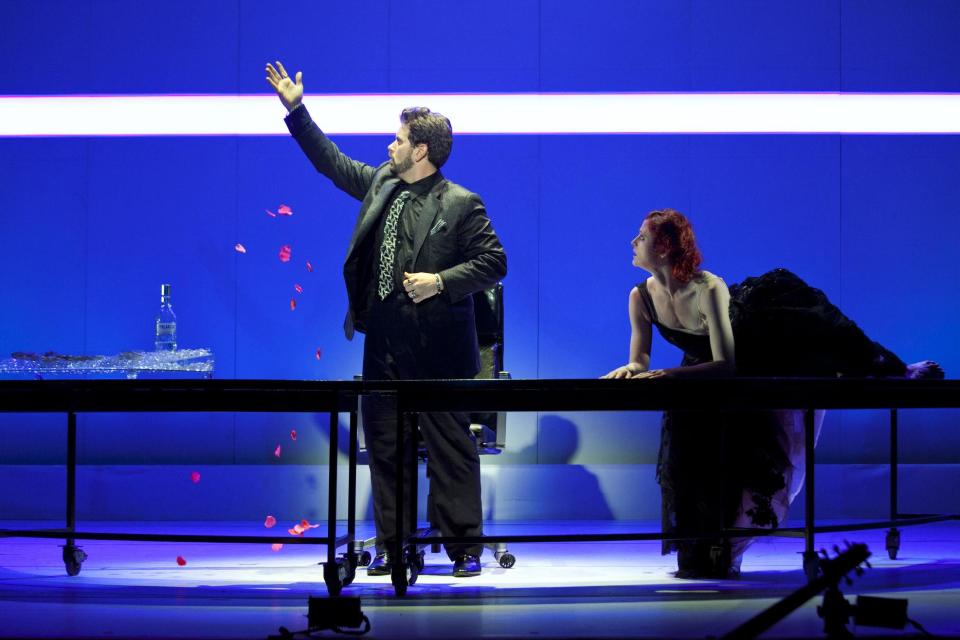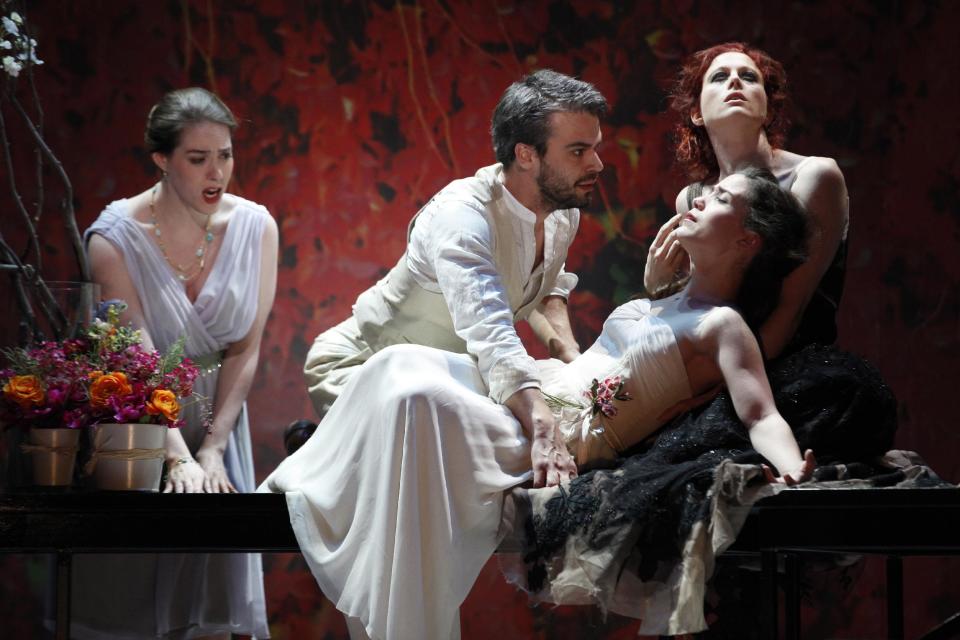Telemann's 'Orpheus' given staging by NYC Opera
NEW YORK (AP) — No longer a major institution and now a shrunken, vagabond company, New York City Opera is ending its first season since departing Lincoln Center with a handsome staging of Georg Philipp Telemann's "Orpheus," a work premiered in 1726 that was long lost before it was rediscovered in 1978.
After starting its four-production, 16-performance season at the Brooklyn Academy of Music, then switching to the Gerald W. Lynch Theater at John Jay College of Criminal Justice, City Opera is ending up at the 599-capacity El Teatro del Museo del Barrio in East Harlem.
The young cast sang earnestly but to mixed results Tuesday night in the second performance of Rebecca Taichman's compelling, modern-dress staging. The biggest applause went to dancer Catherine Miller as Thanatos, an invented character who is an ancient Greek personification of death with long, seductive arms. She also morphs into the snake that bites Eurydice.
There are dozens of operas about the Orpheus myth, including better-known compositions by Monteverdi, Gluck, Haydn and Offenbach. For a work originally known "Die wunderbare Bestaendigkeit der Liebe oder Orpheus (The Wonderful Constancy of Love, or Orpheus)," Telemann composed to a libretto based on Michel Du Boullay's "Orphee" that is mostly in German but also includes segments in Italian and French.
With abundant arias, there is interesting music for all the primary singers, but the composing is less spectacular than other Baroque works. "Orpheus" — pronounced "Orfois" — was given its North American premiere at Wolf Trap in Virginia six years ago, and City Opera says this is the first production in New York.
As Orpheus and Eurydice plan for their wedding, Queen Orasia plots to have Eurydice killed and has her taken to the underworld. Orpheus travels to the underworld and pleads with Pluto, who agrees to return Eurydice on the condition Orpheus not look back at her until they return to the living. Of course, Orpheus doesn't comply and Eurydice is returned to the underworld. Having been rejected by Orpheus, Orasia has him killed. She then realizes he is reuniting with Eurydice, and Orasia commits suicide.
Soprano Jennifer Rowley was a histrionic Orasia. While she displayed a nice coloratura, she had pitch issues for much of the night and her high notes turned hollow. Soprano Joelle Harvey was a Eurydice of sweet voice and disposition, but to some degree she also struggled in sharply ascending portions.
Stronger were the men, with Daniel Teadt displaying a vibrant baritone and excellent German diction in the title role. Baritone Nicholas Pallesen was imposing but a bit blustery as Pluto. David Zinn, the set and costume designer, had him in a dark suit, dark shirt and dark tie, sitting in a contemporary black chair behind a minimalist black desk. Was Taichman trying to make a certain New York opera impresario come to mind?
Tenor Victor Ryan Robertson sang brightly as Orpheus' friend Eurimedes. Sopranos Meredith Lustig (Cephisa) and mezzo-soprano Daryl Freedman (Ascalax) provided energy as Eurydice's bridesmaids. After missing the second half of Saturday's opening performance as Orasia's servant Ismene, Michelle Areyzaga returned and was charming. David Salsbery Fry sang the Bass.
With flirty dresses and light-colored suits, the cast was attractively attired. The sets were simple — although Pluto's staff — in business suits with laptops and headphones — got a bit annoying — especially when they typed frantically over the strings. Donald Holder's striking lighting was memorable, and Mark Dendy's choreography made the three-hour work fly by.
Gary Thor Wedow conducted the 20-piece orchestra with fervor and played the virginal, a member of the harpsichord family. While the house is the right size for a Baroque opera, its dry acoustic was unforgiving to the singers.
There are additional performances on Thursday and Sunday.
City Opera will split next season between BAM and New York City Center, its original home from 1944-65, performing Thomas Ades' "Powder Her Face" and Britten's "The Turn of the Screw" in Brooklyn and Rossini's "Mose in Egitto (Moses in Egypt)" and Offenbach's "La Perichole" in Manhattan.
General Manager George Steel said the company's budget of about $15.3 million this season was balanced for the first time in 12 years, and next year's budget will drop to about $14.2 million. In its first season as a road show, the company was inconsistent but intriguing.
___
Online:
http://www.nycopera.com/



